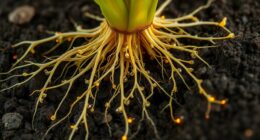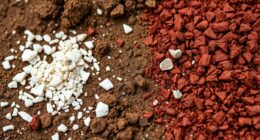Potassium humate fertilizer boosts your soil’s health by enhancing nutrient absorption and improving soil structure. It acts as a natural chelating agent, making essential nutrients like nitrogen, phosphorus, and potassium more available for your plants. This fosters stronger growth, increases resistance to stress, and supports sustainable practices. Easy to apply and safe for your garden, it promotes long-term fertility and vibrant flowering. Keep exploring how this powerful amendment can benefit your garden even more.
Key Takeaways
- Enhances nutrient availability, especially potassium, improving overall plant growth and yield.
- Stimulates microbial activity in soil, boosting organic matter decomposition and nutrient cycling.
- Improves soil structure and water retention, reducing irrigation needs and drought stress.
- Supports sustainable farming by reducing reliance on chemical fertilizers and promoting organic practices.
- Strengthens plant resistance to environmental stresses, diseases, and temperature fluctuations.

Potassium humate fertilizer is a powerful soil conditioner that enhances plant growth by improving nutrient absorption. When you apply it, you’re giving your soil a boost of organic matter that acts as a natural chelating agent, making essential nutrients more available to your plants. This means your crops can uptake important elements like nitrogen, phosphorus, and potassium more efficiently, leading to healthier, more vigorous growth. Unlike synthetic fertilizers that can cause imbalance or leaching, potassium humate helps maintain soil health over time, creating a sustainable environment for your plants to thrive.
Potassium humate boosts nutrient uptake and improves soil health naturally.
You’ll notice that using potassium humate fertilizer can notably improve soil structure. It enhances water retention, so your soil doesn’t dry out quickly and reduces the frequency of watering needed. This is especially beneficial in sandy or degraded soils, where nutrient retention is often poor. The organic compounds in potassium humate also stimulate microbial activity, encouraging beneficial microorganisms that naturally support plant health. These microbes break down organic matter, release nutrients, and suppress soil-borne diseases, fostering a more resilient root environment for your plants.
Applying potassium humate can also boost your plants’ resistance to environmental stresses. If you’re dealing with drought conditions, this fertilizer helps your plants retain moisture and stay hydrated longer. It also enhances the plants’ ability to withstand temperature fluctuations and disease pressure. As a result, your crops are likely to experience less stress, grow stronger, and produce higher yields. Whether you’re cultivating vegetables, fruits, or ornamental plants, integrating potassium humate into your fertilization routine supports overall plant vitality.
Moreover, potassium humate fertilizer is versatile and easy to use. You can apply it directly to the soil, mix it with water for foliar spraying, or incorporate it into compost. Its organic nature ensures that it’s safe for your plants, pets, and the environment. When used consistently, it improves soil fertility, accelerates germination, and promotes robust root development. You’ll find that plants respond quickly, with greener foliage, increased flowering, and better fruiting. Because it enhances nutrient availability naturally, you reduce the need for chemical inputs and promote a healthier, more sustainable gardening or farming practice.
Frequently Asked Questions
How Does Potassium Humate Improve Soil Structure?
You might wonder how potassium humate enhances soil structure. It works by increasing soil’s water retention and aeration, which helps roots grow stronger. When you add it, it promotes the formation of stable aggregates, preventing soil compaction. This makes your soil more friable and easier to work with, ultimately improving drainage and airflow. As a result, your plants get better access to nutrients and water, boosting overall growth and health.
Can Potassium Humate Be Used With Organic Farming Methods?
Yes, you can definitely use potassium humate with organic farming methods. It’s a natural product derived from organic matter, making it compatible with organic standards. When applied, it helps improve soil fertility, enhances nutrient uptake, and promotes healthy plant growth. You simply add it to your compost or foliar spray, trusting that it supports your organic practices without introducing synthetic chemicals. It’s a safe, effective way to boost your crops naturally.
What Crops Benefit Most From Potassium Humate Application?
You’ll find that crops like vegetables, fruits, and legumes benefit most from potassium humate application. It enhances nutrient uptake, boosts growth, and improves soil health, making your plants stronger and more productive. You’ll notice better resistance to pests and diseases, faster germination, and increased yields. Whether you’re growing tomatoes, strawberries, or beans, applying potassium humate can optimize your crop’s development and overall health.
Are There Any Environmental Risks Associated With Potassium Humate?
You’re wondering if using potassium humate poses environmental risks. Generally, it’s considered safe because it’s a natural organic compound, and its application helps improve soil health. However, overuse can lead to nutrient runoff, which might cause water pollution. To avoid this, apply it as recommended and monitor soil and water quality. Proper usage minimizes risks, ensuring you benefit from its advantages while protecting the environment.
How Often Should Potassium Humate Be Applied for Optimal Results?
You should apply potassium humate based on your crop’s needs, typically every 4 to 6 weeks during the growing season. For best results, follow the recommended dosage on the product label and adjust if you notice improvements or deficiencies. Keep in mind that over-application can lead to nutrient imbalances, so observe your plants closely and modify your schedule accordingly to optimize growth and soil health.
Conclusion
Incorporating potassium humate fertilizer boosts your plants’ health, just like a nourishing boost energizes you. While it enhances soil vigor, it also promotes lush growth, making your garden vibrant and thriving. Think of it as the secret ingredient that transforms ordinary plants into extraordinary ones. With its benefits, you get the best of both worlds: richer soil and more beautiful blooms. Embrace potassium humate and watch your garden flourish like never before.









